41 Bizarre Laws That Exist Around The World.
Nathan Johnson
Published
05/19/2021
in
wtf
Some of these laws are just absurd.
- List View
- Player View
- Grid View
Advertisement
-
1.
 Chewing gum was banned in Singapore in 1992, but currently it is not illegal to chew it, just to import it and sell it. In 2004, the ban had a revision and since then it is possible to buy therapeutic, dental, and nicotine chewing gum from a doctor or registered pharmacist. The ban was introduced because vandals had begun sticking chewing gum on the door sensors of MRT trains, preventing doors from functioning properly and causing disruption to train services. Although they were rare incidents, they were difficult to fix and it was almost impossible to catch who did it. These incidents were just the last straw as the ban on chewing gum was brought up earlier, but not approved. Vandals were sticking their gum in mailboxes, inside keyholes, and on lift buttons. Chewing gum left on the ground, stairways, and pavements in public areas was hard to clean, so cleaning cost more and damaged cleaning equipment.
Chewing gum was banned in Singapore in 1992, but currently it is not illegal to chew it, just to import it and sell it. In 2004, the ban had a revision and since then it is possible to buy therapeutic, dental, and nicotine chewing gum from a doctor or registered pharmacist. The ban was introduced because vandals had begun sticking chewing gum on the door sensors of MRT trains, preventing doors from functioning properly and causing disruption to train services. Although they were rare incidents, they were difficult to fix and it was almost impossible to catch who did it. These incidents were just the last straw as the ban on chewing gum was brought up earlier, but not approved. Vandals were sticking their gum in mailboxes, inside keyholes, and on lift buttons. Chewing gum left on the ground, stairways, and pavements in public areas was hard to clean, so cleaning cost more and damaged cleaning equipment. -
2.
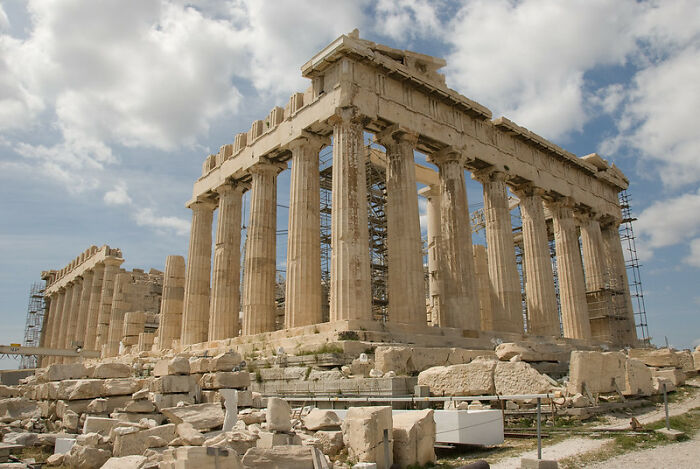 In 2009, the director of Greek prehistoric and classical antiquities, Eleni Korka, said: "Female visitors must wear shoes that do not wound the monuments. These monuments have a skin that suffers and people must realize that." Stilettos can punch holes as the whole body's pressure is on them, so to minimize the wear on the monuments, the ban was introduced.
In 2009, the director of Greek prehistoric and classical antiquities, Eleni Korka, said: "Female visitors must wear shoes that do not wound the monuments. These monuments have a skin that suffers and people must realize that." Stilettos can punch holes as the whole body's pressure is on them, so to minimize the wear on the monuments, the ban was introduced. -
3.
 In the Code of Ordinance of the city Mobile in Alabama, there is a section talking about the use of confetti: “It shall be unlawful and an offense against the city for any person to have in possession, keep, store, use, manufacture, sell, offer for sale, give away or handle any non-biodegradable, plastic-based confetti, serpentine, or other substance or matters similar thereto within the city or within its police jurisdiction.” Paper confetti is fine, but the law is more focused on plastic confetti which doesn’t disintegrate and ends up lying all over green areas.
In the Code of Ordinance of the city Mobile in Alabama, there is a section talking about the use of confetti: “It shall be unlawful and an offense against the city for any person to have in possession, keep, store, use, manufacture, sell, offer for sale, give away or handle any non-biodegradable, plastic-based confetti, serpentine, or other substance or matters similar thereto within the city or within its police jurisdiction.” Paper confetti is fine, but the law is more focused on plastic confetti which doesn’t disintegrate and ends up lying all over green areas. -
4.
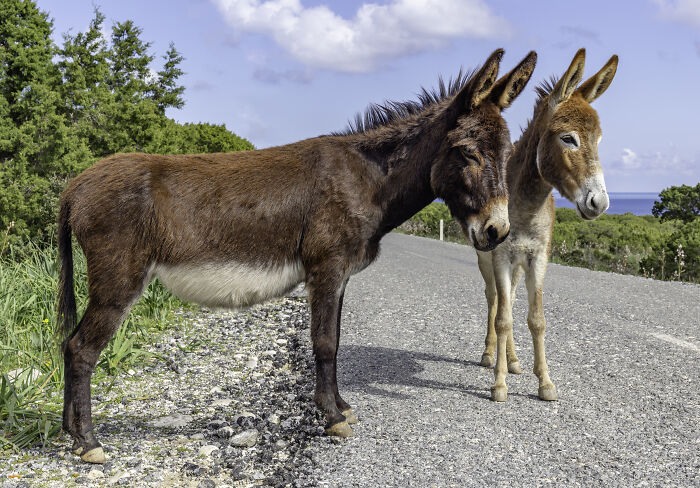 In the state of Arizona, to this day, you can’t let a donkey sleep in your bathtub. The origin of the law is actually a funny story that apparently, nobody wanted to repeat itself. In 1924, a donkey found an abandoned bathtub outside its owner’s property and the animal took it as a good place to sleep. While it was sleeping, a dam near Kingman collapsed, causing a flash flood, and the napping donkey was carried by the waters. The people of the town were after the donkey to save him and after experience, considering the expense and the risks encountered by the rescuers, it was decided that donkeys should not be allowed to sleep in bathtubs.
In the state of Arizona, to this day, you can’t let a donkey sleep in your bathtub. The origin of the law is actually a funny story that apparently, nobody wanted to repeat itself. In 1924, a donkey found an abandoned bathtub outside its owner’s property and the animal took it as a good place to sleep. While it was sleeping, a dam near Kingman collapsed, causing a flash flood, and the napping donkey was carried by the waters. The people of the town were after the donkey to save him and after experience, considering the expense and the risks encountered by the rescuers, it was decided that donkeys should not be allowed to sleep in bathtubs. -
5.
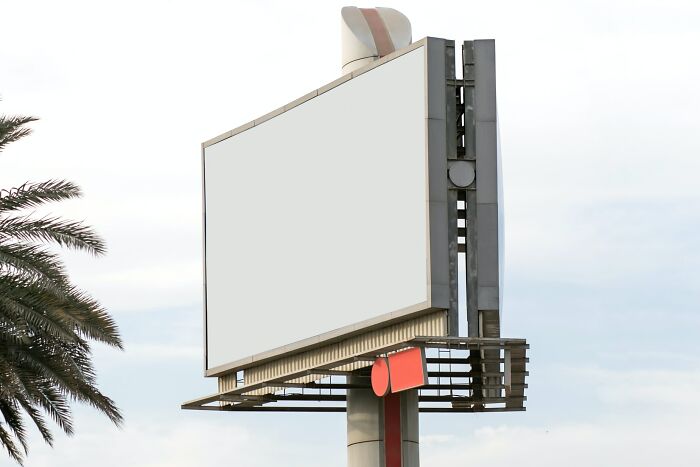 There are four states in the United States that have banned billboards: Alaska, Maine, Vermont, and Hawaii, where the ban was introduced the earliest. Businesspeople understand that this actually benefit them, because billboards ruin the landscape; without them, these states maintain their scenic beauty and attract more people to visit.
There are four states in the United States that have banned billboards: Alaska, Maine, Vermont, and Hawaii, where the ban was introduced the earliest. Businesspeople understand that this actually benefit them, because billboards ruin the landscape; without them, these states maintain their scenic beauty and attract more people to visit. -
6.
 In the small island on the south side of the Gulf of Naples, Capri, there is a local law that dog owners must clean up after their dogs if they poop on the street. Unfortunately, not everyone is obeying the law and to enforce it, Mayor Lembo thought he could take advantage of another existing law requiring all dogs to have blood tests for canine leishmaniasis, and just have the DNA matched. If a person is busted for leaving a mess on the streets, they will be fined €2,000 ($2,400).
In the small island on the south side of the Gulf of Naples, Capri, there is a local law that dog owners must clean up after their dogs if they poop on the street. Unfortunately, not everyone is obeying the law and to enforce it, Mayor Lembo thought he could take advantage of another existing law requiring all dogs to have blood tests for canine leishmaniasis, and just have the DNA matched. If a person is busted for leaving a mess on the streets, they will be fined €2,000 ($2,400). -
7.
 It is illegal to stop on the autobahn in Germany without a serious reason as it is dangerous. The driver is required to make sure that their vehicle is in the right condition to be used, and running out of fuel is not considered a serious enough reason to stop, so it is seen as a violation of this requirement and negligence.
It is illegal to stop on the autobahn in Germany without a serious reason as it is dangerous. The driver is required to make sure that their vehicle is in the right condition to be used, and running out of fuel is not considered a serious enough reason to stop, so it is seen as a violation of this requirement and negligence. -
8.
 In a city of La Paz, Bolivia, married women are allowed to drink only one glass of wine in public. The law is there to prevent them from drunkenly flirting with other men that are not their husband. Also, men can divorce their wives if they are seen drinking in public.
In a city of La Paz, Bolivia, married women are allowed to drink only one glass of wine in public. The law is there to prevent them from drunkenly flirting with other men that are not their husband. Also, men can divorce their wives if they are seen drinking in public. -
9.
 In South Africa, you are prohibited from wrestling a bear. Which is weird not only because who would willingly wrestle a bear, but they don’t even live there naturally.
In South Africa, you are prohibited from wrestling a bear. Which is weird not only because who would willingly wrestle a bear, but they don’t even live there naturally. -
10.
 In 2014 Russia, Belarus and Kazakhstan introduced a regulation which requires clothing in contact with skin to contain at least 6 percent of cotton. Underwear not meeting the requirement was not to be sold in stores. But most luxury lace undergarments have less than 4 percent cotton in them, meaning that the regulation is practically banning it. The reasoning for this was that synthetic fabrics don't absorb moisture as well and can cause skin problems. However, textile producers and shoppers were not happy about this and there were even protests against the ban in Kazakhstan.
In 2014 Russia, Belarus and Kazakhstan introduced a regulation which requires clothing in contact with skin to contain at least 6 percent of cotton. Underwear not meeting the requirement was not to be sold in stores. But most luxury lace undergarments have less than 4 percent cotton in them, meaning that the regulation is practically banning it. The reasoning for this was that synthetic fabrics don't absorb moisture as well and can cause skin problems. However, textile producers and shoppers were not happy about this and there were even protests against the ban in Kazakhstan. -
11.
![In South Australia, if you purposefully disturb a wedding, a funeral, or any religious service, you can be fined $10,000 or be imprisoned for 2 years. In the Summary Offences Act 1953, it is stated, "A person who intentionally obstructs or disturbs a religious service or a wedding or funeral (whether secular or religious) [...] is guilty of an offence."](https://cdn.ebaumsworld.com/mediaFiles/picture/604025/86883429.jpg) In South Australia, if you purposefully disturb a wedding, a funeral, or any religious service, you can be fined $10,000 or be imprisoned for 2 years. In the Summary Offences Act 1953, it is stated, "A person who intentionally obstructs or disturbs a religious service or a wedding or funeral (whether secular or religious) [...] is guilty of an offence."
In South Australia, if you purposefully disturb a wedding, a funeral, or any religious service, you can be fined $10,000 or be imprisoned for 2 years. In the Summary Offences Act 1953, it is stated, "A person who intentionally obstructs or disturbs a religious service or a wedding or funeral (whether secular or religious) [...] is guilty of an offence." -
12.
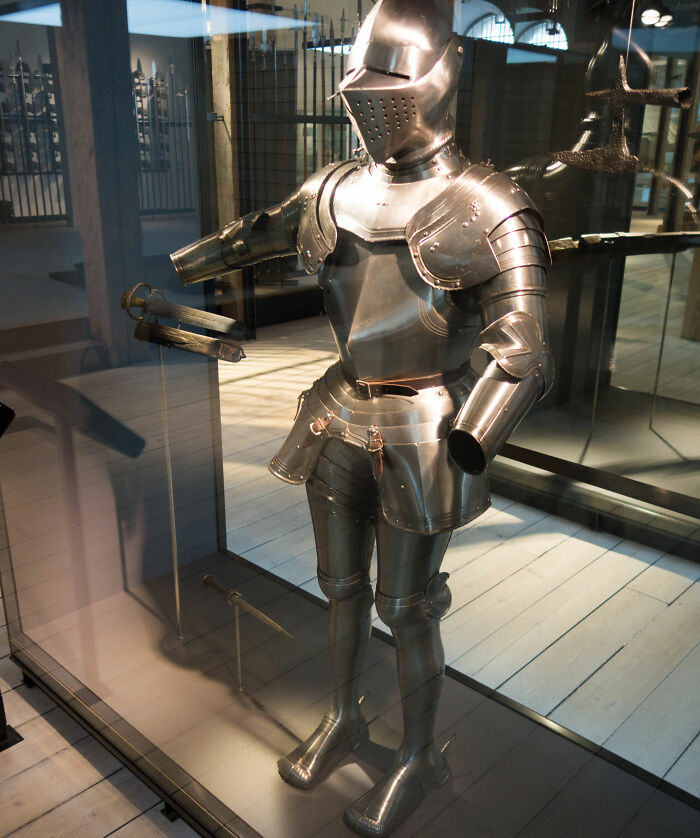 The Statute Forbidding Bearing Of Armour or Coming Armed To Parliament Act 1313 was enacted in 1313 during the reign of Edward II Of England. The law is still in force today, although no one has been prosecuted for this in modern times. It states, "that in all parliaments, Treatises and other Assemblies, which should be made in the realm of England for ever, that every man shall come without all force and armour."
The Statute Forbidding Bearing Of Armour or Coming Armed To Parliament Act 1313 was enacted in 1313 during the reign of Edward II Of England. The law is still in force today, although no one has been prosecuted for this in modern times. It states, "that in all parliaments, Treatises and other Assemblies, which should be made in the realm of England for ever, that every man shall come without all force and armour." -
13.
 Building sandcastles on the beach is a very usual activity not only among kids, but adults too. However, some adults take it to the extreme, building such huge sculptures and castles that they were banned on some beaches in Spain. Some of the sculptures were really intricate, depicting such famous works of art like the last supper, and artists would take tips from tourists. But it doesn‘t affect tourists as long as they build the usual small castles.
Building sandcastles on the beach is a very usual activity not only among kids, but adults too. However, some adults take it to the extreme, building such huge sculptures and castles that they were banned on some beaches in Spain. Some of the sculptures were really intricate, depicting such famous works of art like the last supper, and artists would take tips from tourists. But it doesn‘t affect tourists as long as they build the usual small castles. -
14.
 In Turin, dog owners must walk their dogs three times a day. This rule was introduced in 2006, a year after Rome issued a decree saying that dog owners must walk their dogs at least once a day. This is a way of fighting cruelty against animals. The fines can go up to $600.
In Turin, dog owners must walk their dogs three times a day. This rule was introduced in 2006, a year after Rome issued a decree saying that dog owners must walk their dogs at least once a day. This is a way of fighting cruelty against animals. The fines can go up to $600. -
15.
 From 1948 until 2015, it was illegal to dance after midnight in Japan. The ban was designed to stop prostitution that was linked to dance halls, but it wasn’t really enforced. However, the new law says club seating areas can't be too dark, which is an attempt to discourage crime. Darker clubs should be governed under the old law and have stricter rules for after-midnight operation.
From 1948 until 2015, it was illegal to dance after midnight in Japan. The ban was designed to stop prostitution that was linked to dance halls, but it wasn’t really enforced. However, the new law says club seating areas can't be too dark, which is an attempt to discourage crime. Darker clubs should be governed under the old law and have stricter rules for after-midnight operation. -
16.
 In the city of Baltimore, fortunetelling for money is forbidden and is punishable with a fine or jail: “Every person who shall demand or accept any remuneration or gratuity for forecasting or foretelling or for pretending to forecast or foretell the future of another by cards, palmreading or any other scheme, practice or device, shall be deemed guilty of a misdemeanor and upon conviction thereof shall be fined not more than $500 or subject to imprisonment for not more than 1 year.”
In the city of Baltimore, fortunetelling for money is forbidden and is punishable with a fine or jail: “Every person who shall demand or accept any remuneration or gratuity for forecasting or foretelling or for pretending to forecast or foretell the future of another by cards, palmreading or any other scheme, practice or device, shall be deemed guilty of a misdemeanor and upon conviction thereof shall be fined not more than $500 or subject to imprisonment for not more than 1 year.” -
17.
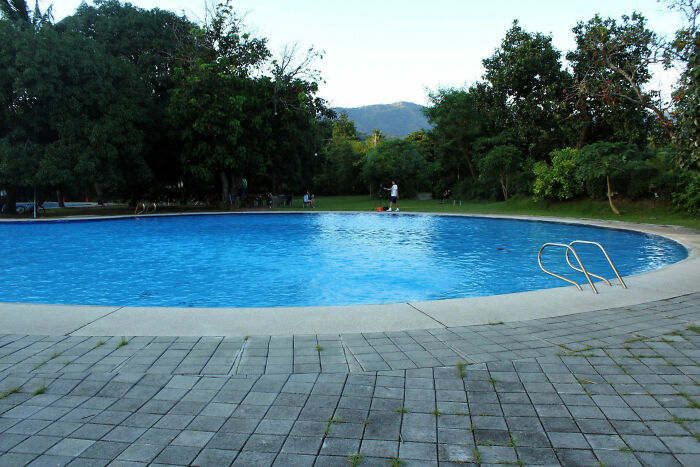 In France, swimming shorts are not allowed to be worn in public swimming pools by men; only skintight swimming trunks are allowed. Apparently, it has to do with hygiene, because men may wear their baggy swim shorts as normal shorts and then they may pick up dust, dirt, and such.
In France, swimming shorts are not allowed to be worn in public swimming pools by men; only skintight swimming trunks are allowed. Apparently, it has to do with hygiene, because men may wear their baggy swim shorts as normal shorts and then they may pick up dust, dirt, and such. -
18.
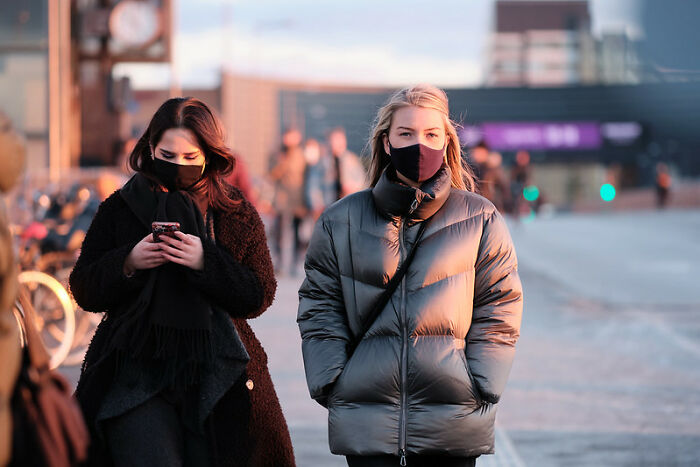 In 2018, Denmark’s parliament approved a law that makes it illegal to wear garments that cover the face in public. It raised concerns that this law is aimed at some Muslim women who wear veils such as the niqab or burqa. Politicians argued that this ban would promote integration, or public safety, or that wearing a veil is inconsistent with national values like gender equality. However, Muslim women expressed that they don’t feel like they are being integrated, but rather discriminated against as wearing veils is their choice.
In 2018, Denmark’s parliament approved a law that makes it illegal to wear garments that cover the face in public. It raised concerns that this law is aimed at some Muslim women who wear veils such as the niqab or burqa. Politicians argued that this ban would promote integration, or public safety, or that wearing a veil is inconsistent with national values like gender equality. However, Muslim women expressed that they don’t feel like they are being integrated, but rather discriminated against as wearing veils is their choice. -
19.
 In 2018, the city of Florence banned people from pausing in the historic center to eat food standing or sitting on sidewalks, roadways, and on the doorsteps of shops and houses. For breaking the law, a person can get a fine up to €500 ($610). It was needed to stop people from littering and keeping the crowded historical center clean.
In 2018, the city of Florence banned people from pausing in the historic center to eat food standing or sitting on sidewalks, roadways, and on the doorsteps of shops and houses. For breaking the law, a person can get a fine up to €500 ($610). It was needed to stop people from littering and keeping the crowded historical center clean. -
20.
![According to the Licensing Act 1872 of the Parliament of the United Kingdom, which enacts various regulations and offences relating to alcohol, “Every person who is drunk while in charge on any highway or other public place of any carriage, horse, cattle, or steam engine […] shall be liable to a penalty.”](https://cdn.ebaumsworld.com/mediaFiles/picture/604025/86883439.jpg) According to the Licensing Act 1872 of the Parliament of the United Kingdom, which enacts various regulations and offences relating to alcohol, “Every person who is drunk while in charge on any highway or other public place of any carriage, horse, cattle, or steam engine […] shall be liable to a penalty.”
According to the Licensing Act 1872 of the Parliament of the United Kingdom, which enacts various regulations and offences relating to alcohol, “Every person who is drunk while in charge on any highway or other public place of any carriage, horse, cattle, or steam engine […] shall be liable to a penalty.” -
21.
 In the city of Oshawa in Ontario, Canada, it has been prohibited to climb trees since 2008. The law states, “No person shall interfere with a tree or part of a tree located on municipal property, including but not limited to attaching, affixing or placing upon in any manner any object or thing to a tree or part of a tree, and climbing the tree.” The city of Oshawa says that they care about their citizens’ safety so they prohibited this activity which can end with injuries.
In the city of Oshawa in Ontario, Canada, it has been prohibited to climb trees since 2008. The law states, “No person shall interfere with a tree or part of a tree located on municipal property, including but not limited to attaching, affixing or placing upon in any manner any object or thing to a tree or part of a tree, and climbing the tree.” The city of Oshawa says that they care about their citizens’ safety so they prohibited this activity which can end with injuries. -
22.
 There is a law that is still in effect today in Victoria, Australia, that states that it is illegal to fly a kite if it‘s an annoyance to other people in a public space. In the Summary Offences Act 1966 section 4, it is stated that “Any person who in a public place flies a kite; or plays at a game to the annoyance of any person, shall be guilty of an offence.”
There is a law that is still in effect today in Victoria, Australia, that states that it is illegal to fly a kite if it‘s an annoyance to other people in a public space. In the Summary Offences Act 1966 section 4, it is stated that “Any person who in a public place flies a kite; or plays at a game to the annoyance of any person, shall be guilty of an offence.” -
23.
 In 2013, a new law was released in China requiring adults to care for their aging parents and visit them at least once a year. If the children fail to provide mental and financial support or don’t visit, they will have to pay fines or face time in jail. Because young adults are focused on their careers and want to be independent, their old parents are being left behind. It’s also because of the family planning policies that it is very easy for the only child to lose contact with their parents. And as China’s population is also getting old, more elderly people become neglected and feel lonely. So various measures are being taken and the "Elderly Rights Law" is one of them.
In 2013, a new law was released in China requiring adults to care for their aging parents and visit them at least once a year. If the children fail to provide mental and financial support or don’t visit, they will have to pay fines or face time in jail. Because young adults are focused on their careers and want to be independent, their old parents are being left behind. It’s also because of the family planning policies that it is very easy for the only child to lose contact with their parents. And as China’s population is also getting old, more elderly people become neglected and feel lonely. So various measures are being taken and the "Elderly Rights Law" is one of them. -
24.
 In 2008, the Japanese government approved a law requiring employers to combat obesity in the workforce or face fines. If the waistlines of employees who are older than 40 and younger than 74 is wider than 33.5 inches for men and 35.4 inches for women, employers may be required to pay more into the national health care system. It is because overweight people more often have high blood pressure, cholesterol and blood glucose which have to be treated. And for the person, they will not be punished, but offered counseling, advice from professionals, or exercise classes.
In 2008, the Japanese government approved a law requiring employers to combat obesity in the workforce or face fines. If the waistlines of employees who are older than 40 and younger than 74 is wider than 33.5 inches for men and 35.4 inches for women, employers may be required to pay more into the national health care system. It is because overweight people more often have high blood pressure, cholesterol and blood glucose which have to be treated. And for the person, they will not be punished, but offered counseling, advice from professionals, or exercise classes. -
25.
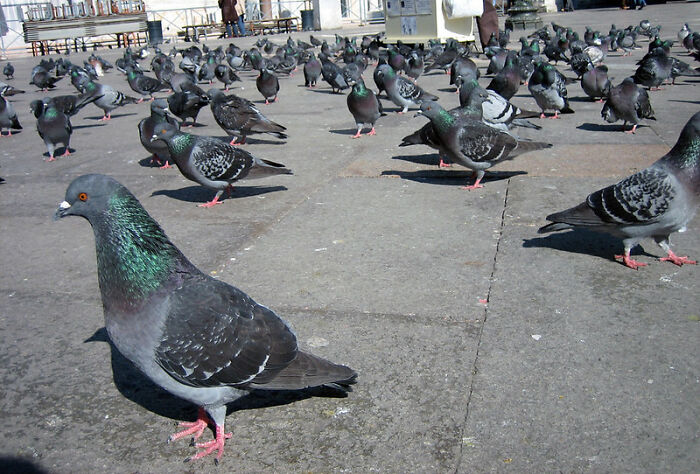 You can’t feed birds in St. Mark's square in Venice. For decades, you could find seed vendors in the square and tourists entertaining themselves by feeding the birds. But the population of pigeons became so dense that in order to save the historical monuments, measures had to be taken. A municipal ordinance banning people from feeding them in the square went into effect in 2008. Experts explained that the birds were pecking at the most exposed parts of the marble and damaging the buildings, they carried several pathogens on them, and that it cost taxpayers about €275 ($334) a year for repairs and cleaning up.
You can’t feed birds in St. Mark's square in Venice. For decades, you could find seed vendors in the square and tourists entertaining themselves by feeding the birds. But the population of pigeons became so dense that in order to save the historical monuments, measures had to be taken. A municipal ordinance banning people from feeding them in the square went into effect in 2008. Experts explained that the birds were pecking at the most exposed parts of the marble and damaging the buildings, they carried several pathogens on them, and that it cost taxpayers about €275 ($334) a year for repairs and cleaning up. -
26.
 According to the Broadcasting Act in Canada, the country’s radio and television broadcasters must include a certain percentage of Canadian content in their programs. Canadian content is considered any content that was at least partly written, produced, presented, or otherwise contributed to by people from Canada. The requirements for radio play is to broadcast 40 percent of Canadian content a year, and for television, it is 55 percent yearly and 50 percent daily.
According to the Broadcasting Act in Canada, the country’s radio and television broadcasters must include a certain percentage of Canadian content in their programs. Canadian content is considered any content that was at least partly written, produced, presented, or otherwise contributed to by people from Canada. The requirements for radio play is to broadcast 40 percent of Canadian content a year, and for television, it is 55 percent yearly and 50 percent daily. -
27.
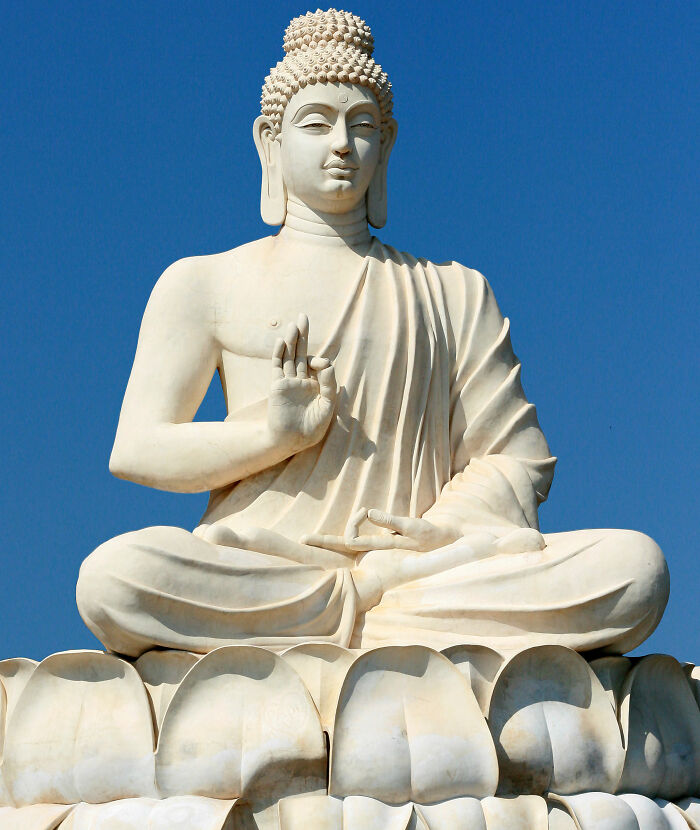 Mistreatment of Buddhist images and artefacts is strictly taboo in Sri Lanka. And when you are taking a selfie, you stand with your back turned to Buddha, which is considered disrespectful, so you shouldn’t take selfies in front of it. They take it very seriously and there was a case of French tourists being convicted under a section of the Penal Code which outlaws deeds intended to wound or insult "the religious feelings of any class of persons" through acts committed in, upon or near sacred objects or places of worship. What did they do you may ask? Well, they were posing for a picture, pretending to kiss a Buddha statue.
Mistreatment of Buddhist images and artefacts is strictly taboo in Sri Lanka. And when you are taking a selfie, you stand with your back turned to Buddha, which is considered disrespectful, so you shouldn’t take selfies in front of it. They take it very seriously and there was a case of French tourists being convicted under a section of the Penal Code which outlaws deeds intended to wound or insult "the religious feelings of any class of persons" through acts committed in, upon or near sacred objects or places of worship. What did they do you may ask? Well, they were posing for a picture, pretending to kiss a Buddha statue. -
28.
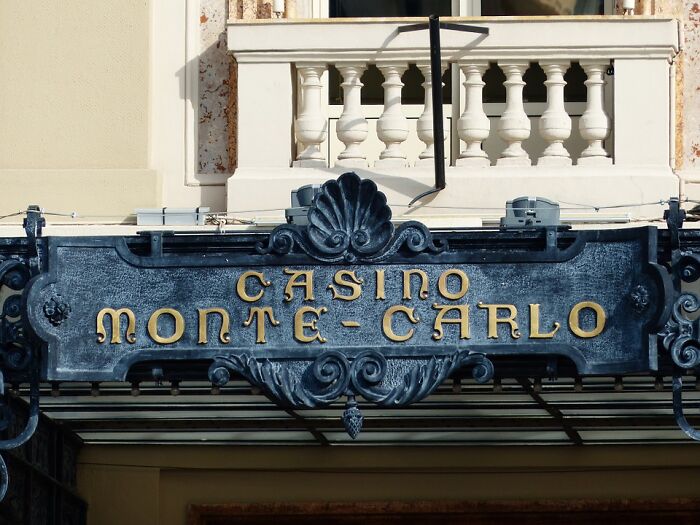 It was always forbidden for residents of Monaco to gamble in The Carlo Casino. When Princess Caroline developed the Monte Carlo Casino in the mid-1800s, she wanted all the revenue to come from foreigners. To compensate Monaco citizens for not allowing this form of entertainment, they are excused from income taxes.
It was always forbidden for residents of Monaco to gamble in The Carlo Casino. When Princess Caroline developed the Monte Carlo Casino in the mid-1800s, she wanted all the revenue to come from foreigners. To compensate Monaco citizens for not allowing this form of entertainment, they are excused from income taxes. -
29.
 If you have accumulated a jar of Canadian coins, it could be that the vendor might not take it. There are limitations on what you can pay for with which coin. Under Canada’s Currency Act of 1985 you can pay "(a) forty dollars if the denomination is two dollars or greater but does not exceed ten dollars; (b) twenty-five dollars if the denomination is one dollar; (c) ten dollars if the denomination is ten cents or greater but less than one dollar; (d) five dollars if the denomination is five cents; and (e) twenty-five cents if the denomination is one cent."
If you have accumulated a jar of Canadian coins, it could be that the vendor might not take it. There are limitations on what you can pay for with which coin. Under Canada’s Currency Act of 1985 you can pay "(a) forty dollars if the denomination is two dollars or greater but does not exceed ten dollars; (b) twenty-five dollars if the denomination is one dollar; (c) ten dollars if the denomination is ten cents or greater but less than one dollar; (d) five dollars if the denomination is five cents; and (e) twenty-five cents if the denomination is one cent." -
30.
![Until 2018, the State Administration For Religious Affairs (SARA) was a part of China‘s government, and in 2007, they issued a decree that all the reincarnations of tulkus of Tibetan Buddhism must get government approval, otherwise the reincarnations would be illegal.
Article 7 of the decree states, “once an application for a living Buddha’s reincarnation has received approval, […] the management organization at the monastery where the living Buddha is registered, or the corresponding Buddhist association, shall establish a search team to look for the reincarnate soul child, and search affairs shall be carried out under the leadership of the guidance team. No group or individual may without authorization carry out any activities related to searching for or recognizing reincarnating living buddha soul children.”
And when the reincarnate is found, the child will have to be approved by the provincial or autonomous regional people’s government religious affairs department, the State Administration For Religious Affairs or the State Council for approval, depending on the size of the living Buddha’s impact.](https://cdn.ebaumsworld.com/mediaFiles/picture/604025/86883449.jpg) Until 2018, the State Administration For Religious Affairs (SARA) was a part of China‘s government, and in 2007, they issued a decree that all the reincarnations of tulkus of Tibetan Buddhism must get government approval, otherwise the reincarnations would be illegal. Article 7 of the decree states, “once an application for a living Buddha’s reincarnation has received approval, […] the management organization at the monastery where the living Buddha is registered, or the corresponding Buddhist association, shall establish a search team to look for the reincarnate soul child, and search affairs shall be carried out under the leadership of the guidance team. No group or individual may without authorization carry out any activities related to searching for or recognizing reincarnating living buddha soul children.” And when the reincarnate is found, the child will have to be approved by the provincial or autonomous regional people’s government religious affairs department, the State Administration For Religious Affairs or the State Council for approval, depending on the size of the living Buddha’s impact.
Until 2018, the State Administration For Religious Affairs (SARA) was a part of China‘s government, and in 2007, they issued a decree that all the reincarnations of tulkus of Tibetan Buddhism must get government approval, otherwise the reincarnations would be illegal. Article 7 of the decree states, “once an application for a living Buddha’s reincarnation has received approval, […] the management organization at the monastery where the living Buddha is registered, or the corresponding Buddhist association, shall establish a search team to look for the reincarnate soul child, and search affairs shall be carried out under the leadership of the guidance team. No group or individual may without authorization carry out any activities related to searching for or recognizing reincarnating living buddha soul children.” And when the reincarnate is found, the child will have to be approved by the provincial or autonomous regional people’s government religious affairs department, the State Administration For Religious Affairs or the State Council for approval, depending on the size of the living Buddha’s impact. -
31.
 Wyoming Statute 16-6-802 requires that newly constructed public buildings include art displays at a cost equal to 1% of the building’s total construction costs (but not to exceed $100,000). If the total cost of construction is less than $100,000, buildings are exempt from this requirement. The legislation was first passed in 1991. The artwork for each project is selected by a committee specifically selected for that project and its purpose is to beautify state buildings and draw attention to the wealth of artists' experience within the region.
Wyoming Statute 16-6-802 requires that newly constructed public buildings include art displays at a cost equal to 1% of the building’s total construction costs (but not to exceed $100,000). If the total cost of construction is less than $100,000, buildings are exempt from this requirement. The legislation was first passed in 1991. The artwork for each project is selected by a committee specifically selected for that project and its purpose is to beautify state buildings and draw attention to the wealth of artists' experience within the region. -
32.
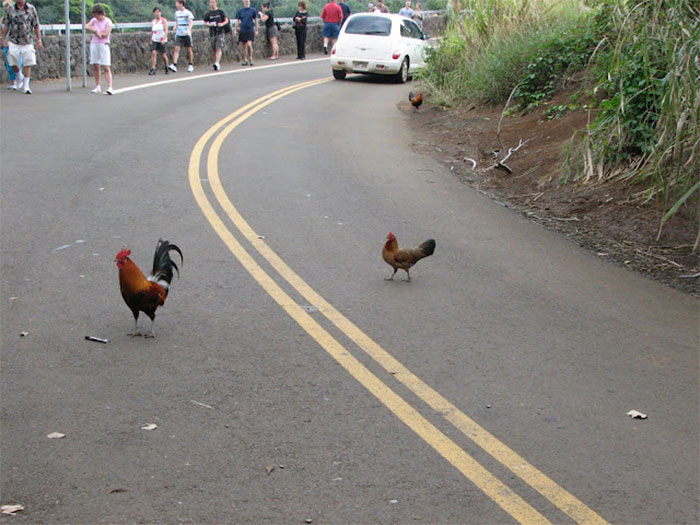 In the United States, in the town of Quitman, Georgia, chicken or other domestic bird owners should keep their domestic fowl away from the streets or other public places. In Chapter 8 of the city’s Code of Ordinance, it is stated, "It shall be unlawful for any person owning or controlling chickens, ducks, geese or any other domestic fowl to allow the same to run at large upon the streets or alleys of the city or to be upon the premises of any other person, without the consent of such other person."
In the United States, in the town of Quitman, Georgia, chicken or other domestic bird owners should keep their domestic fowl away from the streets or other public places. In Chapter 8 of the city’s Code of Ordinance, it is stated, "It shall be unlawful for any person owning or controlling chickens, ducks, geese or any other domestic fowl to allow the same to run at large upon the streets or alleys of the city or to be upon the premises of any other person, without the consent of such other person." -
33.
 Switzerland doesn’t have a specific law against nudity, just a law against indecency. This law was interpreted quite loosely by tourists and naked hiking became a popular thing. People were saying that they felt the sensation of freedom and connection with nature when they hiked naked. The Swiss people didn’t appreciate encountering naked foreigners, so a vote was held in 2009 and it ended with a ban on nude hiking in the small canton in Switzerland, Appenzell Innerrhoden.
Switzerland doesn’t have a specific law against nudity, just a law against indecency. This law was interpreted quite loosely by tourists and naked hiking became a popular thing. People were saying that they felt the sensation of freedom and connection with nature when they hiked naked. The Swiss people didn’t appreciate encountering naked foreigners, so a vote was held in 2009 and it ended with a ban on nude hiking in the small canton in Switzerland, Appenzell Innerrhoden. -
34.
 Some places in the world, like Ghana, Nigeria, Oman, Saudi Arabia, South Africa, Zambia, and others, prohibit civilians from wearing camouflage clothing. It‘s not that the military uniform is prohibited for civilians to wear, but the pattern itself, like on hats or t-shirts. Only military personnel are allowed to wear it.
Some places in the world, like Ghana, Nigeria, Oman, Saudi Arabia, South Africa, Zambia, and others, prohibit civilians from wearing camouflage clothing. It‘s not that the military uniform is prohibited for civilians to wear, but the pattern itself, like on hats or t-shirts. Only military personnel are allowed to wear it. -
35.
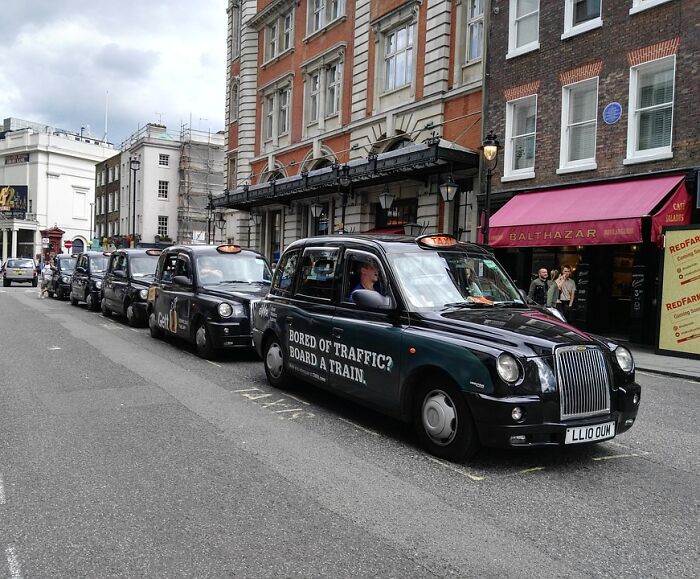 You cannot ride a taxi or any public transportation if you know that you have plague or any notifiable disease, for that matter, like cholera, relapsing fever, smallpox, and typhus. The law is contained in the Public Health (Control of Disease) Act 1985. Public Health Acts date back to the mid-nineteenth century. Even though the law is quite old and plague cases are very rare, we now know how fast a disease can spread.
You cannot ride a taxi or any public transportation if you know that you have plague or any notifiable disease, for that matter, like cholera, relapsing fever, smallpox, and typhus. The law is contained in the Public Health (Control of Disease) Act 1985. Public Health Acts date back to the mid-nineteenth century. Even though the law is quite old and plague cases are very rare, we now know how fast a disease can spread. -
36.
 In Cambodia, the new year usually begins on 13 April or 14 April and the festivities last for three days. Traditionally it involves playing games and it’s a time to enjoy the fruits of their labor at the end of the harvesting season. In the early 2000s, it banned using water guns during the new year festivities in Siem Reap as it was feared that people may shoot acid instead of water.
In Cambodia, the new year usually begins on 13 April or 14 April and the festivities last for three days. Traditionally it involves playing games and it’s a time to enjoy the fruits of their labor at the end of the harvesting season. In the early 2000s, it banned using water guns during the new year festivities in Siem Reap as it was feared that people may shoot acid instead of water. -
37.
 According to Nevada’s Revised Statute 207.220, "Any person or persons opening and passing through gates or bars when gates or bars are placed in fences enclosing fields, or in fences partly enclosing lands, and not shutting and fastening the same, shall be deemed guilty of a misdemeanor." The law was passed in 1861 and has been on the books for well over 150 years. It is possible that the law is the result of Nevada being a ranching state and closing the gates would be important for ranchers to make sure cattle or horses don’t get loose. Also, if someone leaves a gate open, then anyone can enter or leave the property that is not supposed to. However, there is an additional paragraph in the law that the provisions mentioned earlier don’t apply to “gates in towns and cities nor gates necessary in the approach to any building or works where the passing through or into fields or lands is not contemplated.”
According to Nevada’s Revised Statute 207.220, "Any person or persons opening and passing through gates or bars when gates or bars are placed in fences enclosing fields, or in fences partly enclosing lands, and not shutting and fastening the same, shall be deemed guilty of a misdemeanor." The law was passed in 1861 and has been on the books for well over 150 years. It is possible that the law is the result of Nevada being a ranching state and closing the gates would be important for ranchers to make sure cattle or horses don’t get loose. Also, if someone leaves a gate open, then anyone can enter or leave the property that is not supposed to. However, there is an additional paragraph in the law that the provisions mentioned earlier don’t apply to “gates in towns and cities nor gates necessary in the approach to any building or works where the passing through or into fields or lands is not contemplated.” -
38.
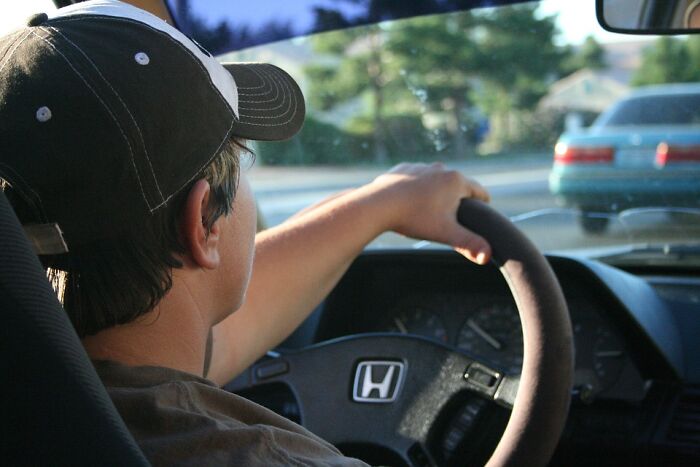 New Jersey Statute 39:4-85 explains the traffic regulations when overtaking another vehicle, which sound normal, like you should pass on the left and return to the right only when you have reached a safe distance from the other vehicle. But there is a peculiar part of the section, saying, “The driver of an overtaking motor vehicle not within a business or residence district shall give audible warning with his horn or other warning device before passing or attempting to pass a vehicle proceeding in the same direction.”
New Jersey Statute 39:4-85 explains the traffic regulations when overtaking another vehicle, which sound normal, like you should pass on the left and return to the right only when you have reached a safe distance from the other vehicle. But there is a peculiar part of the section, saying, “The driver of an overtaking motor vehicle not within a business or residence district shall give audible warning with his horn or other warning device before passing or attempting to pass a vehicle proceeding in the same direction.” -
39.
 In Mexico, you shouldn’t lift your feet from the pedals while riding your bicycle, as it is seen as dangerous because you can lose control and crash. It is an old law, passed in the late 19th century after many accidents between cyclists and animals, pedestrians, and most serious of all, coaches. It was also required for cyclists to have a bell and a lamp at night.
In Mexico, you shouldn’t lift your feet from the pedals while riding your bicycle, as it is seen as dangerous because you can lose control and crash. It is an old law, passed in the late 19th century after many accidents between cyclists and animals, pedestrians, and most serious of all, coaches. It was also required for cyclists to have a bell and a lamp at night. -
40.
![Locusts can be devastating to a farmer if the right measures are not taken. But how would you know that there is an invasion of locusts? The East Punjab Agricultural Pests, Diseases and Noxious Weeds Act, 1949 explains that “in the event of any area being invaded, or in danger of an invasion, by locusts, the Collector of the district or other officer authorised by him in this behalf may call upon any male person not below the age of 14 years resident in the district to render all possible assistance in carrying out preventive or remedial measures and in the destruction of locusts […] it shall not be necessary to notify every person individually for his services, and a proclamation by beat of drum or other customary mode in the village or locality shall be deemed sufficient notice to all affected persons residing in that village or locality.”](https://cdn.ebaumsworld.com/mediaFiles/picture/604025/86883459.jpg) Locusts can be devastating to a farmer if the right measures are not taken. But how would you know that there is an invasion of locusts? The East Punjab Agricultural Pests, Diseases and Noxious Weeds Act, 1949 explains that “in the event of any area being invaded, or in danger of an invasion, by locusts, the Collector of the district or other officer authorised by him in this behalf may call upon any male person not below the age of 14 years resident in the district to render all possible assistance in carrying out preventive or remedial measures and in the destruction of locusts […] it shall not be necessary to notify every person individually for his services, and a proclamation by beat of drum or other customary mode in the village or locality shall be deemed sufficient notice to all affected persons residing in that village or locality.”
Locusts can be devastating to a farmer if the right measures are not taken. But how would you know that there is an invasion of locusts? The East Punjab Agricultural Pests, Diseases and Noxious Weeds Act, 1949 explains that “in the event of any area being invaded, or in danger of an invasion, by locusts, the Collector of the district or other officer authorised by him in this behalf may call upon any male person not below the age of 14 years resident in the district to render all possible assistance in carrying out preventive or remedial measures and in the destruction of locusts […] it shall not be necessary to notify every person individually for his services, and a proclamation by beat of drum or other customary mode in the village or locality shall be deemed sufficient notice to all affected persons residing in that village or locality.” -
41.
![In Trinidad and Tobago, you can’t hang your clothes on a line that is visible from the street. The Summary Offences Act declares, “Any person who commits any of the following offences in any street is, for each offence, liable to a fine of two hundred dollars or to imprisonment for one month, that is to say, any person who […] (e) hangs or places any clothes on any line or cord projecting over any part of any street, or on any wall, fence or paling abutting upon any street.”](https://cdn.ebaumsworld.com/mediaFiles/picture/604025/86883460.jpg) In Trinidad and Tobago, you can’t hang your clothes on a line that is visible from the street. The Summary Offences Act declares, “Any person who commits any of the following offences in any street is, for each offence, liable to a fine of two hundred dollars or to imprisonment for one month, that is to say, any person who […] (e) hangs or places any clothes on any line or cord projecting over any part of any street, or on any wall, fence or paling abutting upon any street.”
In Trinidad and Tobago, you can’t hang your clothes on a line that is visible from the street. The Summary Offences Act declares, “Any person who commits any of the following offences in any street is, for each offence, liable to a fine of two hundred dollars or to imprisonment for one month, that is to say, any person who […] (e) hangs or places any clothes on any line or cord projecting over any part of any street, or on any wall, fence or paling abutting upon any street.”
- NEXT GALLERY
-

- I dont get it..
Chewing gum was banned in Singapore in 1992, but currently it is not illegal to chew it, just to import it and sell it. In 2004, the ban had a revision and since then it is possible to buy therapeutic, dental, and nicotine chewing gum from a doctor or registered pharmacist. The ban was introduced because vandals had begun sticking chewing gum on the door sensors of MRT trains, preventing doors from functioning properly and causing disruption to train services. Although they were rare incidents, they were difficult to fix and it was almost impossible to catch who did it. These incidents were just the last straw as the ban on chewing gum was brought up earlier, but not approved. Vandals were sticking their gum in mailboxes, inside keyholes, and on lift buttons. Chewing gum left on the ground, stairways, and pavements in public areas was hard to clean, so cleaning cost more and damaged cleaning equipment.
41/41
1/41
Categories:
Wtf







0 Comments